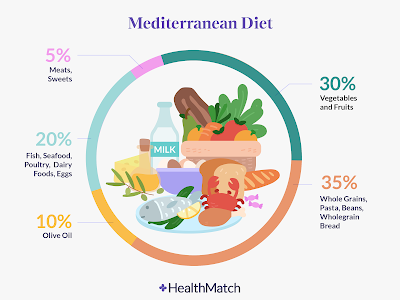The Mediterranean Diet: A Healthy Way of Eating
The Mediterranean diet has gained popularity worldwide for its numerous health benefits and delicious, flavorful meals. This eating pattern is inspired by the traditional diets of countries surrounding the Mediterranean Sea, such as Greece, Italy, and Spain. It emphasizes whole, unprocessed foods and is known for its abundance of fruits, vegetables, whole grains, legumes, lean proteins, and healthy fats. If you're considering adopting the Mediterranean diet, here's what you need to know.
The Mediterranean Diet: A Healthy Way of Eating
Notice
2. Choose healthy fats: Healthy fats, such as olive oil, avocados, and nuts, are a cornerstone of the Mediterranean diet. These fats are high in monounsaturated and polyunsaturated fats, which are beneficial for heart health. Use olive oil as your primary cooking oil and enjoy a handful of nuts or seeds as a snack.
3. Incorporate fish and seafood: Fish and seafood are important protein sources in the Mediterranean diet. They are rich in omega-3 fatty acids, which have been shown to reduce inflammation and lower the risk of heart disease. Aim to have fish, such as salmon, tuna, or sardines, at least twice a week.
4. Moderate poultry, eggs, and dairy: While the Mediterranean diet is primarily plant-based, it does include moderate amounts of poultry, eggs, and dairy products. Opt for lean sources of poultry, such as chicken or turkey, and choose low-fat dairy options, such as Greek yogurt and feta cheese.
5. Limit red meat and processed foods: Red meat and processed foods should be consumed in moderation in the Mediterranean diet. Instead, prioritize lean proteins from plant and seafood sources. When consuming red meat, choose lean cuts and limit your portion size.
6. Enjoy fresh herbs and spices: The Mediterranean diet is known for its flavorful dishes. Use a variety of herbs and spices to add depth and taste to your meals. This not only enhances the flavor but also reduces the need for excessive salt.
7. Stay physically active: The Mediterranean diet is not only about the food you eat but also a holistic lifestyle approach. Regular physical activity is a crucial component of a healthy lifestyle. Aim for at least 150 minutes of moderate-intensity exercise per week.
Tips for the Mediterranean Diet
Here are some tips for following the Mediterranean diet:
- Eat plenty of fruits and vegetables.
- Choose whole grains over refined grains.
- Include legumes, nuts, and seeds in your diet.
- Use olive oil as your main source of fat.
- Eat fish twice a week.
- Limit red meat and processed foods.
- Drink plenty of water.
Remember
Remember, the Mediterranean diet is not a strict regimen but rather a flexible and sustainable way of eating. It promotes overall health, supports weight management, and reduces the risk of chronic diseases. By adopting this dietary pattern, you can enjoy delicious meals while nourishing your body with wholesome ingredients.
